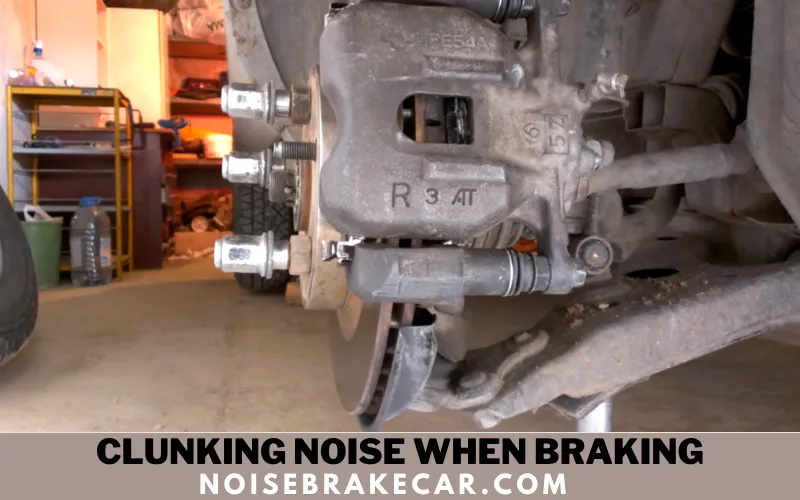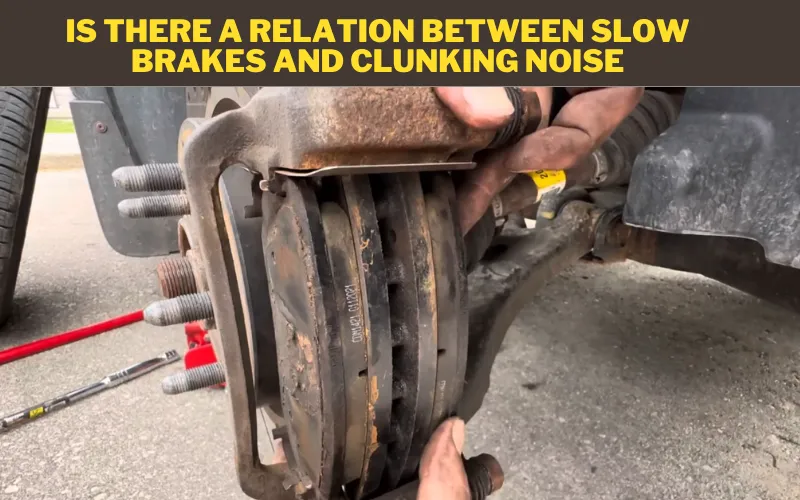If you hear a popping, or knocking noise when braking, there’s a good chance it’s due to lose screws. Check that the screw is tight. If the problem persists. The noise could have several causes. These may be loose terminals that need to be replaced. The problem can also be cause by worn CV joints.
How Do You Diagnose Brake Noise?
The high-pitched noise is most caused by worn brake pads. The metal wear indicator can rub against the rotor as the pads wear and cause a squeaking noise. To diagnose this problem, visually inspect the brake pads and measure their thickness. If they are thin or worn, it times to replace the pads.
Common Causes For The Clunking Noise
Ignoring a loud noise when braking is not an easy option. The noise well definitely faces you to look for the cause of the noise. Because the properly functioning of a car’s brakes is critical to safely. It is too important to diagnose and resolve a loud noise as quickly as possible. Here’s a guide to everything you need to know about your wayward car’s brakes.
Related Article: Why does My Car Squeaking When Turning? + Reasons
Here are most common reason explain for clunking noise.

1) Loose Wheel Nuts
Another possible cause of noise is loose wheel nuts. If the wheel is not properly tightened, it will move and make a knocking noise. To fix this, simply tighten the nuts. But do not over-tighten them us this may damage the wheel hub.
2) Worn Out Control arm bushes
Bushing hold the swingarm in place. Over time, they can wear out and cause the arm to become loose. Which can result in knocking noise when driving slowly or on uneven roads.
3) Ball Joints Defective
Ball joints connect the steering wheel to the steering system. Due to wear and tear they can become loose and make noise or ball joint noise when braking.
4) Steering Stabilizers Defective
Stabilizers bars have a very simple function; Be careful not to allow the steering wheel and arm to brake when suddenly accelerating or braking.
5) Defective and Connections
End links connect the stabilizer bar to the suspension. If they are damaged, they come into connect with other parts and cause annoying noises.
6) Damage in Control Arms
A worn swingarm is common on vehicles that are regularly driven off-road. This causes the wheel to become misaligned, resulting in knocking noises when braking.
7) Damage To Shock Absorbers
Shock absorbers can wear out over time. This can affect the suspension. Regular driving on rough or uneven surfaces can cause damage and knocking noises.
8) Loose Brake Calipers
If your car is not used for a long period of time, corrosion and rust can occur, which can cause the brake calipers to stop working. Parking in a humid environment can also cause this phenomenon. It can also happen that the handbrake cable gets stuck and the brake lock. This is why it is so important to lubricate the brake service cable.
Is there a Relation Between Slow Brakes and Clunking noise?
We all know That brake parts can make a knocking noise when they come into contact with dirt or mud. For example, dirt can get stuck in brake discs noise when braking.

What Is Clunking Sound in front End?
A knocking, rattling or grinding noise from the front while driving can be annoying. Often this loud symptom indicates a problem with the vehicle’s suspension. These noises usually occur when driving over bumps, or potholes.
Here are some possible causes for the loud noises you hear while driving.
- Loose Control Arms
- Worn out Shocks or struts
- Worn ball Joints
- Loose Sway Bar Links
Clunking Noise When braking and Turning
Over time, a knocking noise may occur due to wear and tear on vehicle components. While in most cases this is due to old suspension components, it can also be due ton loose lug nuts or steering components, making it difficult to pinpoint the source of the noise.
Read Also: Squeaking Noise While driving but not brakes applied
How do I diagnose the Clunking Noises?
If you hear a knock when you brake, you need to find out the cause of the noise. It is detected using the methods listed below.
- Shock absorber and strut test
- Control of the upper triangles
- Check The Weather internal connection is terminated
- Inspection of the power steering gear
- Check Lower ball